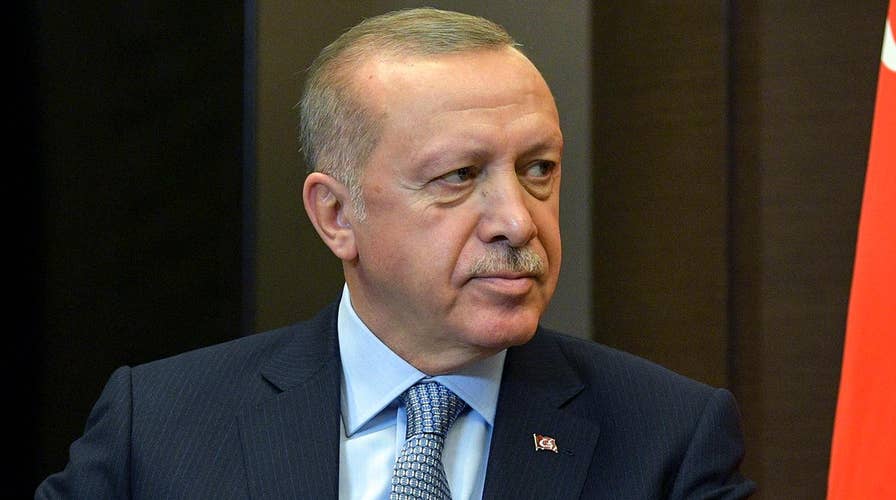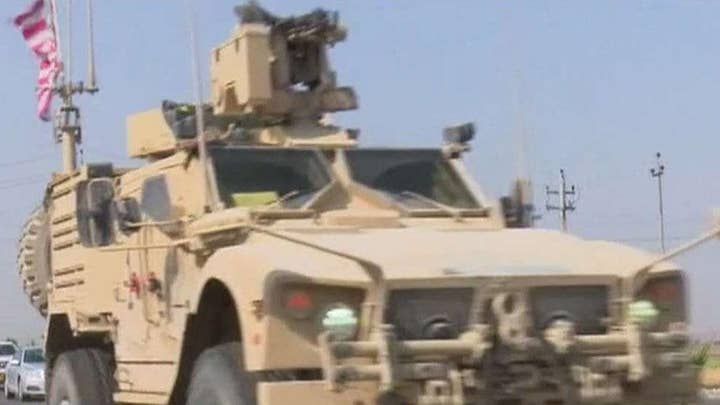Turkey warns Kurds as cease-fire deadline looms in Syria
Turkish President Erdogan says operations will continue if America's promises are not kept on the withdrawal of Kurdish fighters; Lucas Tomlinson reports from the Pentagon.
A former chairman of the Joint Chiefs of Staff said Turkey would not have invaded northeast Syria had U.S. troops remained at their posts. The American retreat "opened the door" for Turkish President Recep Tayyip Erdogan, according to retired Navy Adm. Mike Mullen.
"Erdogan would not send those troops across that border if the Americans were there," Mullen told Fox News' Jennifer Griffin Monday night at the University of Chicago Institute of Politics. "And in that regard, it opens the door. When we were gone, it opened the door."
Only a handful of U.S. service members remain in Syria after President Trump earlier this month ordered the bulk of 1,000 troops to withdraw from the northeastern part of the country and relocate them to Iraq. The move essentially paved the way for Ankara to launch a military offensive on Oct. 9 to push the Kurds out of the region, claiming it wanted to "neutralize terror threats" and establish a "safe zone."
The U.S. and Turkey brokered a 120-hour cease-fire agreement on Thursday that has since expired. Experts and analysts say Ankara's goal is to put an end to any potential autonomous Kurdish state along its border in Syria, as Turkey views the Kurds as terrorists.
“Today is the last day for all the terrorists to vacate in the area," Erdogan said Tuesday before leaving for Russia to meet with President Vladimir Putin in the Black Sea resort city of Sochi. "As of 10 p.m. tonight, the time will expire. Our related agencies are monitoring the situation in the field closely. If the promises America gave us are not kept, our operation will continue."
Turkey and Russia later announced Tuesday that the nations will conduct joint patrols along the border region following the removal of Kurdish forces there. Russian military police and Syrian troops will push Kurdish forces back 18 miles from Syria's northern border within 150 hours starting Wednesday at noon local time, Russian Foreign Minister Sergey Lavrov said.
Putin and Erdogan met for more than six hours before speaking to reporters to announce the joint patrols. The fact that a NATO ally preferred to patrol the border with Russian forces and not American forces made Pentagon officials scratch their heads.
And according to Mullen, that's exactly what the U.S. didn't want to happen.
"Everybody we would want to lose in this is going to win. Putin's going to win in Russia. [Syrian President Bashar] Assad's going to win in Syria. ISIS is going to win. Erdogan's going to win. Iran is going to win. And we and our friends are going to lose,“ he said.
Mullen served as chairman of the Joint Chiefs of Staff from 2007 to 2011 and has more than four decades' experience in the military.
The former chairman contradicted Defense Secretary Mark Esper and the current chairman of the Joint Chiefs, Gen. Mark Milley, who both say that a few dozen U.S. troops would not have stopped a Turkish invasion of 15,000, including so-called mercenaries accused of carrying out war crimes against the Kurds. Complicating matters, Iraq's military says the hundreds of U.S. troops that arrived yesterday from Syria are not welcome.
IRAQ'S MILITARY SAYS US TROOPS LEAVING SYRIA DON'T HAVE PERMISSION TO STAY IN COUNTRY
Mullen's statements also directly conflicted with what Secretary of State Mike Pompeo told Fox Business' Maria Bartiromo when asked if he thought Turkey would have invaded Syria even with U.S. troops there.
"One-hundred percent," he said. "I was very closely involved when President Erdogan notified us that he was prepared to move and that he was going to do so in hours. President Trump saw there were American soldiers in the way... To think we were going to have NATO-on-NATO fighting -- the president made the right decision at the moment to get American forces out of the way."
Between 200 and 300 U.S. troops remain in southern Syria at Al-Tanf.
Fox News' Lucas Tomlinson, Jennifer Griffin, David Asman and Greg Norman contributed to this report, as well as The Associated Press.










































